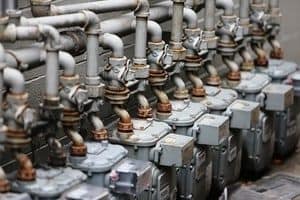Public Utility Commissions (PUCs)
The United States has what is called a Public Utility Commission for each state. This commission is made up of three different groups. Today you’ll learn what those groups are and what role they play in the PUC.
 You’re aware that you have an electric and a utility company, but did you know the Public Utility Commission is actually who controls the rates and services those companies can provide to you? We’ll talk about that and more, but first, what exactly is the PUC and what bodies are part of it?
You’re aware that you have an electric and a utility company, but did you know the Public Utility Commission is actually who controls the rates and services those companies can provide to you? We’ll talk about that and more, but first, what exactly is the PUC and what bodies are part of it?
Public Utility Commissions (PUCs)
First, let’s break down the three different parts of the Public Utility Commission and what role each plays in the government agency.
What Does A Public Utility Commission Do?
The Public Utilities Commission, or PUC for short, is a regulatory agency that helps control and provide service using utilities like power, natural gas, electric, and water. There is at least one Public Utilities Commission for each state, and they partner with the PSC and URC which you’ll read about next.
What Is The Purpose Of The Public Service Commission?
The main purpose of the Public Service Commission, or PSC, is to show impartiality, accountability, integrity, and leadership to all areas of the government.
They oversee government sectors and make sure that all processes follow strict professional standards and the moral code. The Public Service Commission is also part of the governing body for PUCs, along with the Utilities Commission, and Federal Energy Regulatory Commission.
What Is The Energy Regulatory Commission?
The Utility Regulatory Commission, also known as URC, is part of the overall governing group that helps control several utilities for the United States. This includes things such as prices and services. This is part of the Federal Energy Regulatory Commission.
This is what the United States calls the federal agency that helps control the selling of electricity and natural gas. The Federal Energy Regulatory Commission deals with interstate commerce and helps with the transmission and transportation of energy and gas as well.
PUC And Energy Deregulation
The Public Utility Commission plays a part when it comes to energy deregulation. Energy deregulation is when a state decides to give less control to a utility company. This will allow for cheaper plan prices for consumers, greener energy, and more control over which supplier you choose as a resident or business.
Here is a table with the states that enforce deregulation and which utilities are deregulated.
| State | Deregulated Electricity | Deregulated Gas |
|---|---|---|
| Nevada | Yes | No |
| California | No | Yes |
| Texas | Yes | No |
| Colorado | No | Yes |
| illinois | Yes | Yes |
| Florida | No | Yes |
| Michigan | Yes | Yes |
| Ohio | Yes | Yes |
| Washington D.C | Yes | Yes |
| Pennsylvania | Yes | Yes |
| Maryland | Yes | Yes |
| Delaware | Yes | No |
| New York | Yes | No |
| Maine | Yes | No |
| Connecticut | Yes | No |
| New Hampshire | Yes | No |
| New Jersey | Yes | Yes |
What Does A Public Utility Commission Do?
Control Utility Delivery Rates
Many people don’t realize that they have both an electricity supplier and a utility supplier. The utility supplier is who the electricity company gets its power from. Think of them as the middle-man.
Utility suppliers will charge a delivery rate that is approved by the Public Utility Commission. This allows the PUC to help control the price of utilities. If a utility company wants to charge a particularly high price, the PUC can deny it, protecting the public from higher rates.
Protect The Consumer
Speaking of protecting the consumer, that’s one of the main reasons that there is a public utility commission in the first place. They protect the public from unethical issues when it comes to their utilities.
If you’ve ever been scammed by a company pretending to be your electric company, you can actually file a complaint with the Public Utility Commission and they will help you with the necessary steps moving forward.
Manage Competitive Market
 If electricity companies had their own rules, we’d all be paying a lot more for our utilities. Thankfully, the Public Utility Commission helps to regulate and manage prices and services. This is where energy deregulation and the PUC are working together in various states.
If electricity companies had their own rules, we’d all be paying a lot more for our utilities. Thankfully, the Public Utility Commission helps to regulate and manage prices and services. This is where energy deregulation and the PUC are working together in various states.
One unique thing about the Public Utility Commission is that each state PUC has its own mission statement. This helps the public understand their role and what the commission stands for, including the public interest, education, and economic development.
Divisions And Departments
The PUC supports the following divisions and departments:
Telecommunications
Telecommunications are phone services that telephone service providers offer to the public. The PUC manages these services and rates.
Water/Wastewater
The PUC also manages any water used in a home. Whether it’s used to drink, bathe, or even water the lawn.
Natural Gas
The Public Utilities Commission manages states that have natural gas. It’s important to note that not every state has natural gas, but every state does offer gas-related energy.
Transportation
If you’ve ever taken public transportation, you have a PUC to thank for the fares and maintaining the upkeep for buses, subways, and more.
Customer Choice Programs
If you live in an energy deregulated state, there are customer choice programs available to you. To find out more, check out the links provided below.
| State | Program |
|---|---|
| Ohio | Apples to Apples Ohio |
| Connecticut | Energize Connecticut |
| New York | New York Power to Choose |
| Pennsylvania | PA Power Switch PA Gas Switch |
| Texas | Texas Power to Choose |
| Illinois | Plug In Illinois |
| Maryland | Maryland Electric Choice |
| Maine | Maine Office of the Public Advocate |
FAQs
How do I file a complaint with the Public Utilities Commission?
You will be able to easily file a complaint form online. Find the Public Utilities Commission for your state and click “file complaint” on their website. You will then be led with prompts on how to complete the complaint.
How do I contact the PUC?
You’re best bet is to reach out via phone or email.
How do I file a complaint against a power company?
You can file a complaint against a power company by reaching out to the public utility commission for your state. You can find out which public utility commission is responsible for your state. Then reach out to them with your complaint.
Summary
By now, you are practically an expert on the Public Utility Commission. You’ve learned the different roles within the commission and how they are involved with electric and utility companies. Hopefully, this guide taught you something new and possibly even answered questions you may have had beforehand.
Updated on
